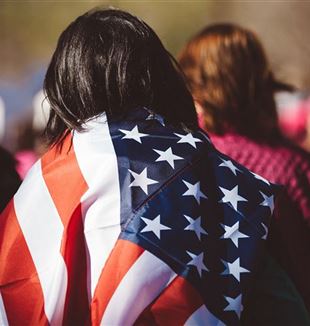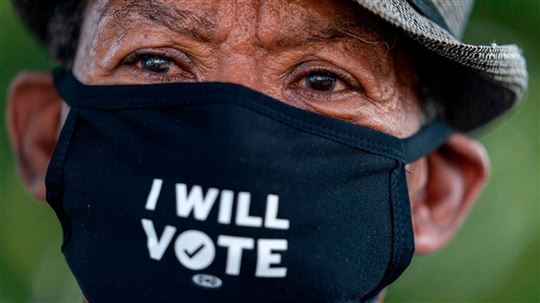
USA. What is next?
The presidential election in November, political polarization, unemployment, and racism... these are all part of a single challenge facing American society: “Choosing reality instead of the world of ideas.” From October Traces.In 1859, Fitzjames Stephen said about the Great Eastern, on the occasion of its launch as the first transatlantic steamship, that it “or some of her successors... will perhaps defy the roll of the Atlantic, and cross the seas
without allowing their passengers to feel that they have left the firm land. The voyage from the cradle to the grave may come to be performed with similar facility. Progress and science may perhaps enable untold millions to live and die without a care, without a pang, without an anxiety. They will have a pleasant passage, and plenty of brilliant conversation... but it seems unlikely that they will have such a knowledge of the great ocean on which they sail, with its storms and wrecks, it currents and icebergs, its huge waves and mighty winds, as those who battled with it for years together in the little craft.”
For some time now, it seems that the goal of many Americans is an effort- less journey on the Great Eastern, trying to stay safe and not to be troubled too much by life. Then, all of a sudden, the steamship came to a halt. First came Covid-19, and then the societal and economic repercussions of the pandemic and all of its other consequences. The lack of familiarity with the great ocean, with the business of living, causes great anxiety and uncertainty–so, what is next?
For many, the first attempt to respond was to keep living as they did before, searching for an elusive “new normal,” reluctant to face what was happening; they just kept dancing to the music of the orchestra on the Titanic. We offer two examples. On the economic front, the government took a step of historical dimensions at the end of March, allocating $350 billion in grants, loans, and subsidies to support small businesses, critical sectors, the unemployed, and private citizens. In the following months, many were in favor of renewing the subsidies which, in the case of the unemployed, are often more than what they earned before Covid-19. In other words, the starting premise is that the government will continue to support the country, whose people won’t ask where these outrageous amounts of money are coming from and who will repay the debt caused by the spending. A similarly short-sighted solution can be found in education. Teachers’ unions led lawsuits and threatened strikes in states where governors wanted to reopen schools in September–rightly protecting teachers' health, but seemingly failing to consider as well the impact of closing schools and distance learning can have on learning outcomes, on the socioeconomic disparities among students, and on school finances, especially on private schools.
November 3rd is the presidential election. It clear that the political polarization in the U.S. is at a peak right now; however, the real problem is something totally different. Neither side looks at reality, the reality of the Covid-19 pandemic, unemployment, and racism. Instead, they use them to promote their ideologies, focusing on uncertainty and promising to eliminate people’s fears. Yet “you’re never going to do away with fear, anxiety, and insecurity in the human condition. Ever,” observed American philosopher Cornel West in a recent interview for the Rimini Meeting, paraphrasing Reinhold Neibuhr, who believed that democracy is finding proximate solutions to insoluble problems. West continued: “We should never be surprised by evil, whatever form it takes, and you should never be paralyzed by despair. He or she that never despaired never lived. Now part of the question in America is that Americans view themselves as innocent, so they figure catastrophe is alien to them.” Now that no one can escape the drama, he concluded, “now that the whole world has the blues,” and everyone has discovered that they feel sad, anxious, and wounded, “that is the fork in the road in everybody’s life. Everybody’s got wounds; what are you going to do with them? Are you going to be a wounded lover and helper and healer? Or are you going to be a wounded hater and trasher and reinforce both your wounds and the world’s?”
These are questions that have, in the face of the dramatic events of recent months, also touched the CL communities in America. The US has seen deaths and protests, the explosion of the Black Lives Matter movement, social unrest, and the movement to defund the police. In the Movement’s assemblies, discussions, and conversations over the summer, the first discovery was that no one is immune to the ambient polarization, the divisions between those who throw themselves into the mix and protest in the streets and others who say that racism is a structural problem that has always existed and will always exist, between the youth who feel the urgent need to react against injustice in order to build a more just society and the adults, who the youth feel do not understand them. The work of the summer brought to light that no one is immune to the instinctive attempt to escape reality, to remove oneself by pretending that everything is fine, believing that ultimately these things have nothing to do with us. For Peter, a PhD student studying physics in Chicago, the killings and demonstrations were something distant that he did not take much interest in. Then one evening, a violent protest march passed below his window during the hours of the curfew Chicago put in place to contain the chaos. “Why are these people protesting?” he asked himself. “What makes them risk being arrested for breaking the curfew?” After that he began to become invested, following the news more, to study and to discover that, behind the events of recent months is a world that he knew very little about. At the same time, he came to a painful realization. “I am here to tell you that ‘I want to build a better place, I want to do this, I want to do that,’ but if I think about who I am and who my friends are... If I think about my university, I cannot name one member of the cleaning staff who works there.”
Others found themselves looking at their experiences and the circumstances in their lives, only to find that, as someone put it, they “also participate in this violence, in this lack of love for my neighbor.” If all of these initiatives remain only in the realm of ideas, even if they are good ideas, even though they may bring people to the streets to protest, they do not last. This is because racism is not just a historical problem, but also a personal problem. “I, too, can be violent.” So then, if we ask others to change without beginning from a personal conversion, a more just society will not happen.
Only by looking at reality, starting by facing the open-ended question of our wound, can a person have the boldness to realize that the steamship has become stranded and take the risk to go down into the cargo hold to get her hands dirty and try to do something. She begins to respond to the need, even when the unimaginable happens, even when everything seems to be falling apart, working as she is able, in anyway possible. This is the approach taken by the 140 entrepreneurs, managers, professors, and economists who, when the economic crisis began, came together to form the professional network Ergon. It is a community of professionals who meet weekly to discuss the challenges they face and to help others by mentoring, networking, and assisting each other in writing their CVs and preparing for interviews.
Carolina also followed the path of responding to reality. She is a young principal working in an impoverished area of Boston, in a predominately Latino school where many of the students are undocumented. When schools closed in March due to the Covid-19 outbreak, Carolina was confronted with two hundred families that had no way of putting food on the table now that their children were no longer receiving the free meal from the school cafeteria provided to low-income families. In the midst of the chaos of the pandemic, the city seemed unable to quickly assemble assistance programs, and providing subsidies and food stamps to undocumented immigrants was not allowed. Carolina approached restaurants closed due to the new restrictions and asked them to donate leftover food. She began to collect food every week around the neighborhood and to distribute it to the families of the school.
Read also - Daryl's encounters
During an assembly in which the question, “How has your life changed and how is it still changing as a result of the changes brought by Covid-19?” was posed, many people described how they found it difficult to be stuck at home and felt trapped into a repetitive daily routine. Carolina responded to the question by talking about these families that struggled to put food on the table and who were sometimes evicted from their homes for not paying their rent. A few hours later, six families called her and said, “Count us in. We want to come with you to distribute the food packages around the city.” This continued throughout the summer, and the families of the school now know Carolina’s friends and their children by name.
The real danger, fundamentally, is to live in a world of ideas that does not allow us to grow, that causes us to lose familiarity with the business of living. Instead, people who are willing to dive into reality, to weather the storms, and to build with what they have, develop a joy in living and a love for life that, even in the midst of the dramatic events and challenges of the past months, becomes greater and greater.